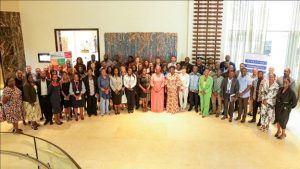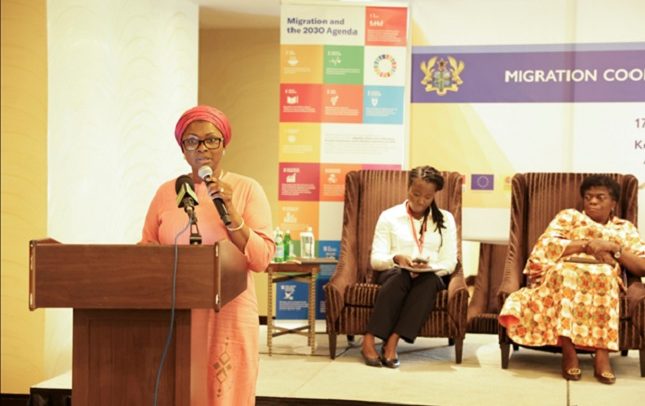Fatou Diallo Ndiaye speaking at the MCP meeting
Stakeholders in the migration sector have called for a targeted approach in the implementation of the recently approved Diaspora Engagement Policy (DEP).
Speaking at the bi-annual meeting of the Migration Coordination Platform (MCP) in Accra, representatives of government agencies, civil society, and other relevant stakeholders said targeting areas like education, agriculture, manufacturing, real estate and climate change in the DEP implementation would help the country derive the needed benefits of the policy.
The Diaspora Engagement Policy, approved by Cabinet in August 2023, is aimed at promoting a constructive engagement between Ghana and its Diaspora for the purpose of achieving sustainable development of the country.
It is also intended to strengthen systems for involving the Ghanaian Diaspora in mobilizing resources for sustainable national development.
Director of Diaspora Affairs, Office of the President, Akwasi Awuah Ababio, said the Ghanaian Diaspora represents between 1.5 and 3 million citizens living abroad, mainly in Nigeria, Cote d’Ivoire, UK, USA, Germany, the Netherlands, Canada, among others.
Mr. Ababio said in 2020, the country received an estimated USD $4.3 billion in remittances (around 6.1 percent of its GDP).
“The true volume of remittances is likely much higher, as this data does not capture informal money transfers,” he said.

Mr. Ababio noted that the World Bank studies have shown that international remittance receipts have helped Ghana to reduce poverty by nearly 5% indicting that migrants play a vital role in the development of their countries of origin through remittances, investment and trade.
“These contributions can lead to economic growth, reduced unemployment and increased wages,” he added.
Mr. Ababio thus highlighted the policy’s four strategic objectives which includes to promote capacity-building and enhancement of Diaspora-homeland relationship for the mutual benefit of both parties and to provide legal instruments and programmes that extend some rights and privileges that Ghanaians in Ghana enjoy to their counterparts in the Diaspora.
“Others are to strengthen systems for involving the Ghanaian Diaspora in mobilizing resources for sustainable national development; and to facilitate the production and dissemination of accurate and relevant data on the Ghanaian Diaspora to strengthen the homeland’s further sustainable engagement with the Diaspora,” stated.
Chief of Mission, IOM Ghana (Resident), Togo, Benin, Fatou Diallo Ndiaye, commended the government for delivering on its promise to provide a framework to enhance the meaningful relationship that exists between the Ghanaian Diaspora and the homeland.
She said the Diaspora is a large and extremely diverse group that contributes in different ways to the development of both Ghana and countries of destination.
“They contribute substantially through financial and social remittances according strong ties to Ghana with their places of events in terms of culture, society and most critically, they support investment in critical sectors of the economy,” she noted.
She said it was therefore critical for stakeholders to discuss the challenges confronting the Diaspora in channeling investment back home and identify the critical sectors of the economy that are open to Diaspora investment, recognizing the mechanism that exists to facilitate this investment.
Chief Director of the Ministry of Interior, Adelaide Annor- Kumi, said the government recognizes the importance of leveraging the development potential of the Diaspora, as exemplified through the establishment of the Diaspora Affairs Office (DAO) under the Office of the President (OoP), and the Diaspora Directorate under the Ministry of Foreign Affairs, to oversee all Diaspora engagement activities to harness the benefits of migration.
She further noted that the government has also established Diaspora Desk Offices at all diplomatic missions abroad to encourage the return and participation of the Ghanaian Diaspora in the national development process.
“All these underscore the commitment of the government to engage the Diaspora in national development. A number of significant legal and institutional developments continue to inform Ghana’s engagement with the Diaspora,” she said.
Mrs. Annor-Kumi, however, noted that in spite of the significant progress made, a lot more needs to be achieved in terms of transit, investment from the Diaspora, and also expending the existing regime to facilitate their engagement.
“I urge all of us go beyond the return, let’s focus our attention on the implementation of the right strategies to ensure that the major outcomes from this meeting does not remain on our shelves,” she added.
MCP
The Migration Coordination Platform (MCP) was created in 2021 by development partners and multilateral agencies working in the migration sector in Ghana to better coordinate their interventions.
It seeks to identify programmatic and geographic gaps in migration management, encourage information sharing on relevant interventions, and facilitate joint interventions amongst members.
It constitutes two subgroups, one under the thematic area of Border Governance and the other under the thematic area of Return and Reintegration.
Within this framework, meetings for the subgroups are set for every three months while the MCP meets every six months.
In line with the objective of sharing information and developing joint actions, the MCP organizes a national seminar every year to further understanding and information exchange on contemporary migration issues.
By Jamila Akweley Okertchiri


